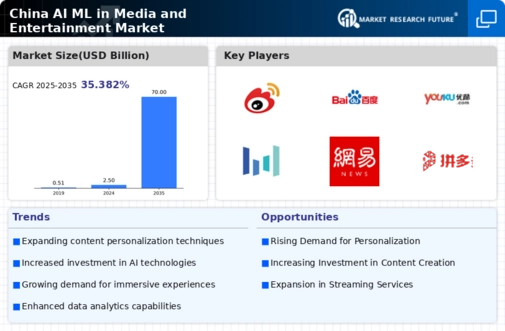Advancements in AI Technology
Technological advancements in AI are significantly influencing the ai ml-in-media-and-entertainment market in China. Innovations in machine learning algorithms and natural language processing are enabling content creators to develop more sophisticated applications. These advancements facilitate the automation of various processes, from content generation to audience targeting. Reports suggest that the integration of AI technologies could enhance operational efficiency by up to 30%, allowing companies to allocate resources more effectively. As AI continues to evolve, its applications in media and entertainment are likely to expand, fostering new opportunities for growth and creativity.
Evolving Consumer Preferences
Consumer preferences in China are rapidly evolving, significantly impacting the ai ml-in-media-and-entertainment market. With the rise of digital natives, there is a growing expectation for content that is not only entertaining but also tailored to individual tastes. This shift is prompting media companies to leverage AI and machine learning to analyze viewer data and create customized experiences. Market analysis indicates that personalized content can increase viewer retention rates by as much as 20%, underscoring the importance of adapting to consumer demands. As preferences continue to shift, the ability to deliver relevant content will be crucial for success.
Government Support and Investment
The Chinese government is actively promoting the development of the ai ml-in-media-and-entertainment market through various initiatives and funding programs. This support is aimed at fostering innovation and enhancing the competitiveness of domestic companies. Recent government reports indicate that investments in AI-related projects have increased by over 40% in the past year, reflecting a strong commitment to advancing technology in the media sector. Such backing not only accelerates research and development but also encourages collaboration between public and private sectors, ultimately driving the growth of the ai ml-in-media-and-entertainment market.
Rising Demand for Interactive Experiences
The ai ml-in-media-and-entertainment market in China is experiencing a notable surge in demand for interactive experiences. This trend is driven by consumers' increasing desire for personalized and engaging content. As a result, companies are investing heavily in AI and machine learning technologies to create immersive environments that enhance user engagement. According to recent estimates, the market for interactive media is projected to grow by approximately 25% annually, indicating a robust appetite for innovative content delivery methods. This shift towards interactivity is reshaping traditional media consumption patterns, compelling businesses to adapt their strategies to meet evolving consumer expectations.
Integration of Augmented and Virtual Reality
The integration of augmented reality (AR) and virtual reality (VR) technologies is transforming the ai ml-in-media-and-entertainment market in China. These immersive technologies are being increasingly utilized to create engaging content that captivates audiences. The market for AR and VR is expected to grow at a compound annual growth rate (CAGR) of around 30% over the next five years, driven by advancements in hardware and software capabilities. This growth presents opportunities for media companies to innovate and differentiate their offerings. As AR and VR become more mainstream, their incorporation into media strategies will likely enhance viewer experiences and drive market expansion.
















